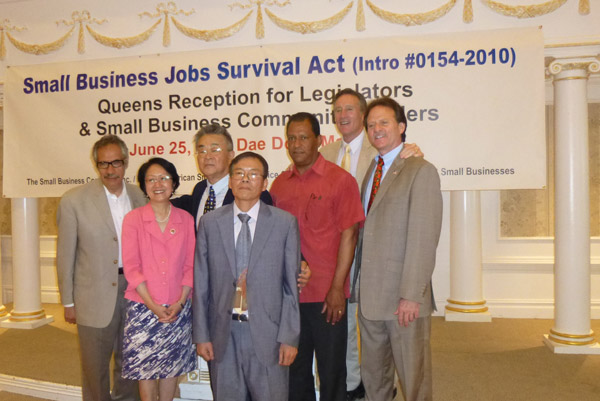
BY SHARON WOOLUMS | Because of the positive response to my June 6 talking point in The Villager, “Will a Democrat for mayor stand up for small stores?” and a desire of many to know more, it seemed important to simply ask the candidates: “Will you stop the closing of our small businesses?” Voters deserve answers.
To help determine if a candidate’s small business platform is viable, top small business expert Sung Soo Kim was consulted to craft the questions. Laymen can be fooled by economic language and figures, but Mr. Kim cannot. Chairman of the first Mayor’s Small Business Advisory Board for former Mayors Dinkins and Giuliani, founder of the Korean American Small Business Service Center, the New York City Small Business Congress and the Coalition to Save New York City Small Businesses, Kim created The Small Business Bill of Rights that has been given to our elected officials since 1993. For 32 years, Mr. Kim gave more testimony at public hearings before the City Council and forums than all advocates combined.
The pending bill, the Small Business Jobs Survival Act (S.B.J.S.A.), now bottled up in committee for three years, which would give commercial tenants rights to negotiate fair lease terms with landlords, is the ultimate test for Democratic candidates’ proposed solution to a crisis.
Candidates proclaiming Democratic progressive values on social issues must also assure us at this crucial crossroads that they will take a sharp left away from Giuliani’s and Bloomberg’s failed Republican economic inroads — vigorous opposition to any regulation of landlords — and toward the S.B.J.S.A.
Every election, despite candidates’ usual spouting of buzzwords hailing small businesses’ importance to the economy’s health — “engine of economic growth and job creation,” “backbone of our economy,” etc. — once elected, nothing changes and the same economic philosophy continues. The rich get richer and small businesses and the middle class suffer, leaving no avenue to success.
The S.B.J.S.A. states: “The New York City commercial rental market has been negatively influenced by speculators for such an extended period of time that the interest of small businesses and job creation, and the broader general economic interest of the City, are being harmed. An unacceptable number of established small businesses are being forced out of business solely as a result of the commercial lease renewal process.”
When will the threshold of “acceptable” be reached so that candidates are no longer content to remain silent as store owners are losing their life’s savings and workers are losing their jobs because landlords will not accept reasonable returns on their investments?
Although, regrettably, no candidate responded to our questionnaire, the candidates’ records speak for them:
Public Advocate Bill de Blasio and Comptroller John Liu have similar histories. In October 2008, then City Councilmembers de Blasio and Liu, both sponsors of the S.B.J.S.A., made stopping the closing of businesses a priority campaign issue. Attending the hearing on the bill, forums and rallies, both were strong voices of support for S.B.J.S.A. to fight economic inequality. They pledged, if elected, to fight rent-gouging and unscrupulous landlords’ extorting cash from small business owners.
Up to 82 percent of small businesses here are owned by immigrants. Liu was a successful product of that hard-working immigrant community where small businesses provided jobs, leading to many achieving the American Dream.
Today, de Blasio and Liu still have similar policies on small business, yet these have changed from last election. Now neither speaks of rent-gouging or illegal extortion — or of the S.B.J.S.A. They stopped referring to small businesses as facing a crisis or needing help to survive. The focus of small businesses’ problems shifted from high rents to excessive fines.
“Unburdening small businesses” under siege by fines is the primary problem, de Blasio claims.
Meanwhile, Liu is doing what he accused Bloomberg of doing, failing to acknowledge what he knows — that exorbitantly high rent is the problem. We hope Liu decides to be the loud voice for the immigrant small business owners calling for economic equality, as he once did, rather than the silent voice for unscrupulous landlords.
Bill Thompson’s and Speaker Quinn’s small business policies were practically the same in the last election. Throughout the campaign, it is purported that Thompson and Quinn avoided public hearings, rallies and forums addressing the crisis. Neither commented on the S.B.J.S.A. before the City Council, nor criticized Bloomberg’s economic policies, which small business advocates claimed were destroying their livelihoods and costing thousands of New Yorkers jobs. Thompson’s and Quinn’s ignoring the crisis so frustrated Hispanic merchants that they postered their store windows asking customers not to vote for either.
Speaker Quinn made no significant small business initiatives until October 2009, when she made a monumental decision that would have a negative impact upon the future of small businesses, their employees and our economy.
A June 29, 2009, hearing was held on the S.B.J.S.A. At the hearing, the chairman of the Small Business Committee, David Yassky, stated his belief that we absolutely have to do something — period — and that doing nothing was not an option. Agreeing with the merchant leaders, Yassky became a sponsor of the bill, with every member of the committee and 32 city councilmembers backing it, enough support for the bill to pass the Council.
In early October a vote by the committee was requested, but denied due to Quinn’s legal staff claiming concerns and expressing doubts that it would stand up to a court challenge. At the bill’s public hearing, the real estate lobby, the city’s largest, did not testify regarding any legal concerns with the bill. Quinn’s legal staff, however, which had not attended the hearing, made the legal claim on behalf of the real estate industry months later.
Unlike de Blasio and Liu, who have changed their positions this time around, Thompson and Quinn did not. They still avoid reference to small businesses being in a crisis due to sky-high rents and neither mentions the S.B.J.S.A., reintroduced in 2010 with Councilmember Margaret Chin the new prime sponsor, nor are they critical of Bloomberg’s economic philosophy.
Today, Thompson calls himself “a champion for the middle and working class” but he offers no meaningful solutions.
To present an image of being pro-small business, Quinn joined with the mayor in promoting small business initiatives that don’t address the real problems.
Anthony Weiner’s small business plan in his “Keys to the City” shows little understanding of Main Street small businesses. But Weiner, the newcomer, hopefully will further develop his plan and, with keys to the city, finally unlock some doors while keeping others from closing, reversing Bloomberg’s economic policies.
Since the candidates chose not to respond to our questionnaire here, you may ask these pertinent questions at the next mayoral debate, to help understand why our world is changing around us and why, despite our desperate concerns, nothing has been accomplished to stop our stores from closing. There is a lifeline, the S.B.J.S.A. — the only real solution. We hope one of the candidates will grab hold of this very fair measure to save the few remaining mom-and-pop stores from disappearing before our eyes.
This article’s headline originally referred to commercial rent control. However, the Small Business Jobs Survival Act does not contain any mention of rent control, but rather to mediation and arbitration for commercial lease renewals, among other things.



































